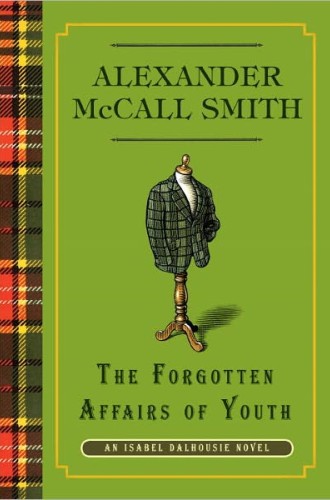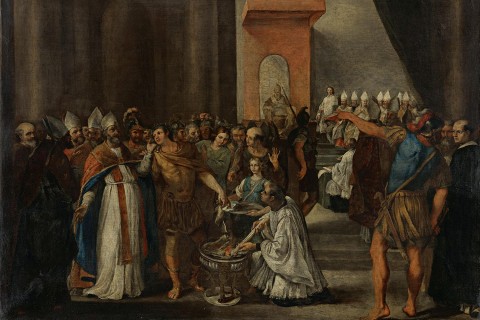The Forgotten Affairs of Youth, by Alexander McCall Smith
Isabel Dalhousie, the Edinburgh-based philosopher who edits the Journal of Applied Ethics, is not everyone's cup of tea. Her niece, Cat, is usually irritated with her. The former chair of her editorial board, Professor Lettuce, can't stand her. And quite a few fans of Alexander McCall Smith's No. 1 Ladies' Detective Agency series—at least among those who leave comments on Amazon—are less than enthusiastic about his Isabel Dalhousie novels.
Nevertheless, Jamie (Isabel's fiancé) and Charlie (their toddler son) adore her. Grace (her housekeeper) is unswervingly loyal. And she has a small cadre of diehard followers like me who will drop anything to read the newest installment in this series, which now numbers eight books. I'm guessing that most of these followers recognize a kindred soul in the constantly ruminating philosopher. Perhaps, like Isabel, they consider the moral implications of every possible deed, done or undone. Maybe they identify with her observation that "so much that went through our minds was odd in one way or another: unexpected, unconnected, unimportant; mental flotsam swilling around with sudden moments of clarity and insight. A hotch-potch of memories, plans, dreams, random bits of silliness: the very things that made us human."
Read our latest issue or browse back issues.
I mean, how can one not appreciate a woman who, when the server asks, "And have you decided?" responds, "About the nature of reality? Or about lunch?"
In The Forgotten Affairs of Youth, Isabel—who has the habit of meddling in other people's business—helps Jane Cooper, an Australian philosophy professor doing research in Edinburgh, learn more about the parents who gave her up for adoption 40 years earlier. That's the main plot, if indeed plot is a word that can be applied to any book in this series, which devotes a lot more time to Isabel's thought processes than to anything actually happening in Scotland. There are also several meandering subplots. One involves truth, family loyalty and mushrooms. Another has to do with Professor Lettuce's embarrassing nephew. Yet another features Grace's spirit medium and a turbine company. And then there are the romantic subplots. Will the improbably handsome but vain and stupid Sinclair be Cat's next unsuitable boyfriend? Will Jamie and Isabel ever remember to marry?
None of these plots and subplots, however, gets started until halfway through chapter 2. Isabel is just too busy thinking about unrelated things: the tribal rituals of rugby, for instance; James IV's ill-fated experiment in natural language; permanence and our sense of the future; moral philosophy for two-year-olds; the proximity of gratitude to pride; how many boyfriends one can have in a lifetime and still be respectable. All these topics run through Isabel's mind before her morning cappuccino at Cat's deli.
And Isabel's thoughts keep swarming all day long, page after plotless page. One might expect to find such an approach in a literary novel of the morose school, in which doomed people reflect on dysfunctional relationships and distorted psyches until, by the final chapter, the reader knows there is no hope at all. But McCall Smith writes comic novels. His protagonists are good people who want to help others. His villains are sometimes buffoons, sometimes misguided, but never evil. His books celebrate happiness, beauty, friendship, faithfulness, tradition and love. It can be disconcerting to find such charitable optimism paired with relentless introspection.
Jamie—the love of Isabel's life—is usually patient with her musings, though he occasionally tries to bring her back to earth. One morning, for instance, as they survey the damage a fox has done to her alliums, Isabel begins considering the moral lives of animals, the ease with which humans tell lies, and the possible malevolence of Moby-Dick. "He didn't exist," says Jamie. "You can't pay attention to the emotions of fictional characters, especially if they're whales. All you're doing there is reflecting what the author thinks."
I suspect McCall Smith thinks a lot like Isabel. Both are professional ethicists. Professor emeritus of medical law at the University of Edinburgh, McCall Smith has been vice-chair of the UK's Human Genetics Commission, chair of the British Medical Journal's ethics committee and a member of UNESCO's international bioethics commission. Isabel's creator, like his constantly cogitating protagonist, has an unusually fertile imagination: he has published some 35 novels in the last dozen years (four in 2011 alone), besides a number of books for children and academics.
Most of McCall Smith's faithful readers start with the No. 1 Ladies' Detective Agency series, whose 13th volume will be published in April. Set in Gaborone, Botswana, these addictive books blend detection (usually of minor miscreants, not murderers), Motswana lore and a humorous look at human nature. Their protagonist, the "traditionally built" Mma Ramotswe, is unforgettable. These are wonderful reads for long winter evenings after stressful days at the office.
Academics, or those who love them, might prefer to make McCall Smith's acquaintance through the Professor Dr. von Igelfeld series (Portuguese Irregular Verbs, The Finer Points of Sausage Dogs and At the Villa of Reduced Circumstances), hilarious send-ups of academe. The books are short, wildly improbable, and perfect to stuff in a jacket pocket or handbag before your next flight.
The Isabel Dalhousie novels fall somewhere between those two series. As a scholar and editor, Isabel must deal with academic trivia and rivalries, some of which are almost as absurd as von Igelfeld's scrapes. As a mother, fiancée, aunt, employer and busybody, she gets as involved in other people's lives as Mma Ramotswe. Add the thick layer of philosophical pondering, and you get stories for theologians, philosophers and compulsive cogitators to take on holiday.
Such readers will appreciate the fact that Iain Torrance, president of Princeton Theological Seminary and professor of Christian ethics, is a minor character in Forgotten Affairs. And though McCall Smith does not include a lot of theological references in his books, religion shows up several times in this one. Isabel has "misgivings about people not having a spiritual life," she tells an acquaintance, but she hates "the divisiveness of religion; its magical thinking, its frequent sheer nastiness." Still, she concedes, a spirituality based on a "feeling of awe, of immanence" is both real and necessary, "because otherwise we live in a world in which there is no real answer to evil."
If Isabel says little about God, she says a lot about people—their oddities, their foibles, their goodness, their desire for the beautiful, their worthiness of respect. "After all, the other person—the stranger—shared those attributes that made each of us, every single one of us, so interesting, so morally significant: a life; a particular set of experiences; emotions; hopes; a family. In each of us there is something of human value, some grain of wisdom. If that did not count for something, then nothing . . . counted."
At the very end of the book, a walk-on character confides to Jamie, "I've never believed in God, but I do believe in his love." Love abounds in all of McCall Smith's books—not sentimental treacle but hearty, good-natured love of humanity. And that is why some of us love Isabel Dalhousie, even if she thinks too much.






